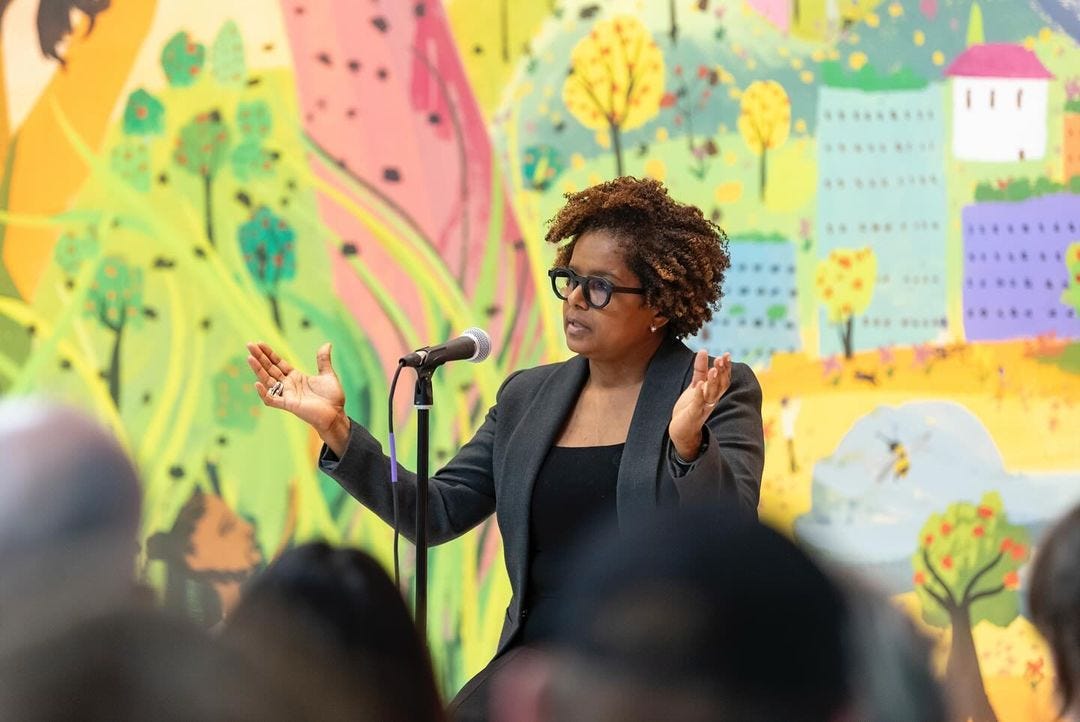Right now, talking bout the future can feel pretty scary, especially when you consider our looming climate crisis. An existential humanitarian threat that requires unprecedented levels of international cooperation to mitigate?
A skosh daunting.
So when I left a talk given by Sheila Foster at the Climate Museum last week with a sparkle of hope in my heart, I took time to relish it, and now I want to (hopefully) share some of that sparkle with you.
The Work
Sheila Foster is a leading scholar of environmental law and justice, specifically concerning the potential of city commons as a means of realizing it.
In her work, Foster deconstructs our current public/private ownership binary and makes the case for treating urban space as a shared resource capable of meeting the unique needs of a community.
Essentially, it’s exploring the realities of a less top-down approach. One where governments develop plans alongside, instead of for, their constituents by empowering residents to be routinely engaged, and even serve as decision-makers.
A practical example of this would be a local government working alongside residents to transform city-owned vacant lots into necessary shared infrastructure. If Neighborhood X is in a food desert with minimal access to healthy and affordable options, then they may opt to establish a community garden that’s collaboratively stewarded by local shareholders with government support.

The Wins
We love a good idyllic theory, but Foster is out there proving how this model can transform urban spaces and tangibly help communities through LabGov, an international research institute she co-founded.
LabGov is focused on developing and testing specific methods and policies that foster partnership between local governments and residents for the collaborative management of urban spaces and resources — a.k.a. Co-City governance.
What started as a one-off field experiment in Bologna, Italy to boost civic engagement has since grown to include a full-on playbook for co-governance implementation and over 400+ commons-based projects in 130+ cities around the globe.
Right in my backyard, LabGov is partnering with Silicon Harlem to improve reliable internet access for low-income residents by developing a “co-governed, community-based, high-speed network.”
My most basic understanding of the “How” is that by developing an edge cloud infrastructure with locally managed servers instead of faraway data centers, users can enjoy lower costs which subsequently increases access. Not to mention other massive benefits like improved energy efficiency (Climate win!) and inherently stronger security.
The Future
Spoiler: I can’t predict the future. What I do know, is that we have to be prepared to do things differently if we want things to change for the better.
Now, imagine a reality where society is fundamentally changed and things…well…actually work.
If you’re finding that difficult, I’m not surprised.
The world we live in is a far cry from the one we want. Yet, we are rarely invited to dream of a reality where those problems are solved without detractors (external or internal) mining our creativity for every impracticality.
Don’t get me wrong, rationality has its time and place, but we cannot pursue an idea we never allowed ourselves to have because of an assumed impossibility.
On its face, the concept of co-governance sounds a lot like an unrealistic fantasy compared to our pervasive top-down models, but the expanding work of Sheila Foster and LabGov tells a different story. A fruitful experiment in one neighborhood can be just the proof of concept needed to ripple through an entire city, state, country…you get it.
I’m thrilled to know there are people out there shaking up systems with new ideas. Ideas that give me a roadmap to expand what I believe is possible for the future, and bring the vision for a just world into clearer focus.
Today, permit yourself the chance to dream of a radically different tomorrow, one that fills you with excitement and optimism for the future. Feels good, right? Hold on to that feeling for the next time hopelessness and nihilism threaten to overwhelm and keep you from acting at all.
I’ll leave you with the wise words of American poet Lucile Clifton, “We cannot create what we can't imagine.”


I just read “On Fire: The Case for a Green New Deal is Naomi Klein”. It was published in 2019 so a little outdated but it touches on concepts like this! I love to hear about one such org in action!